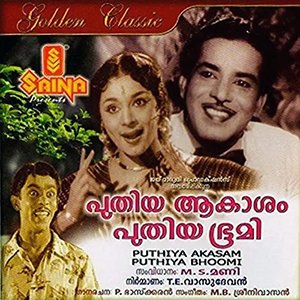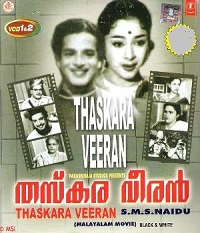
Velayudhan Chempakaraman Thampi ofThalakulam (1765–1809) was the Dalawa or Prime Minister of the Indian kingdom of Travancore between 1802 and 1809 during the reign of Bala Rama Varma Kulasekhara Perumal. He is best known for being one of the earliest individuals to rebel against the British East India Company's authority in India.

N. Sreedharan Nair, popularly known as Kottarakkara Sreedharan Nair or just Kottarakkara, was an Indian actor who appeared Malayalam movies. He hailed from Kottarakkara in Kollam district of Kerala.

Puthiya Akasam Puthiya Bhoomi is a 1962 Malayalam-language film, directed by M. S. Mani, starring Sathyan and Vinodini. It is based on Thoppil Bhasi's play of the same name that was first staged in 1959. The film received a certificate of merit at the Indian National Film Awards.
Chilamboli is a 1963 Indian Malayalam-language film, directed by G. K. Ramu and produced by Kalyanakrishna Iyer. The film stars Prem Nazir, Sukumari, Adoor Bhasi and Thikkurissy Sukumaran Nair. The film had musical score by V. Dakshinamoorthy.
Devaalayam is a 1964 Indian Malayalam-language film, directed N. S. Muthukumaran and Ramanathan. The film was produced by Manneth David. The film stars Prem Nazir, Adoor Bhasi, Thikkurissy Sukumaran Nair and Kedamangalam Sadanandan. The film had musical score by V. Dakshinamoorthy.
Kalanjukittiya Thankam is a 1964 Indian Malayalam-language film, directed by S. R. Puttanna. The film stars Sathyan, Ambika, Adoor Bhasi and Thikkurissy Sukumaran Nair. The film had musical score by G. Devarajan. The movie is a remake of 1962 Kannada movie Gaali Gopura.

Jeevithayaathra is a 1965 Indian Malayalam-language film, directed by J. Sasikumar and produced by K. P. Kottarakkara. The film stars Prem Nazir, Madhu, Sheela, Ambika, Sukumari and Adoor Bhasi. The film had musical score by P. S. Divakar.
Sarpakadu is a 1965 Indian Malayalam-language film, directed by J. D. Thottan and produced by P. K. Sathyapal. The film stars Madhu, Sukumari, Ambika and Adoor Bhasi. It was released on 31 December 1965.
Mynatharuvi Kolakase is a 1967 Indian Malayalam-language film, directed and produced by Kunchacko. The film stars Sathyan, Sheela, Adoor Bhasi and Hari. The film had musical score by V. Dakshinamoorthy.
Nurse is a 1969 Indian Malayalam-language film, directed by Thikkurissy Sukumaran Nair and produced by P. Subramaniam. The film stars Jayabharathi, Thikkurissy Sukumaran Nair, Muthukulam Raghavan Pillai and Bahadoor. The film had musical score by M. B. Sreenivasan.
Swargaputhri is a 1973 Indian Malayalam-language film, directed and produced by P. Subramaniam. The film stars Madhu, Vijayasree, Thikkurissy Sukumaran Nair and Muthukulam Raghavan Pillai. The film had musical score by G. Devarajan.

Randidangazhi is a 1958 Malayalam political film based on the novel of the same name by Thakazhi Sivasankara Pillai and directed by P. Subramaniam with Miss Kumari, P. J. Antony, T. S. Muthaiah, Thikkurissy Sukumaran Nair, Kottarakkara Sreedharan Nair, S. P. Pillai, Bahadoor, Adoor Pankajam, Soman and J. A. R. Anand in the star cast. It received a certificate of merit at the National Film Awards.
Ara Nazhika Neram is a 1970 Malayalam film, directed by K. S. Sethumadhavan and written by Parappurath, based on his own novel Ara Nazhika Neram. Parappurath also played a minor role in the film. The story of the film revolves around an Orthodox Christian family headed by Kunjenachan, a ninety-year-old patriarch who lives his life by The Book. The film also features Prem Nazir, Sathyan, Ragini, Sheela, K. P. Ummer, Adoor Bhasi and Ambika Sukumaran.
Ambika Sukumaran Nair is an Indian actress best known for her work in Malayalam cinema during the 1950s and 1960s. She is a close relative of the Travancore Sisters; Lalitha, Padmini and Ragini, and also Shobana, Vineeth, Krishna and Sukumari. Ambika also was initiated to go along that path and she debuted in Udaya Studio's film Visappinte Vili in 1952 she is also the first herion of Premnazir. In 1968, she acted as the lead actress in the first full-length comedy in Malayalam cinema Viruthan Shanku, directed by P. Venu. She acted in more than 80 movies.

Thaskaraveeran is a 1957 Indian Malayalam-language film, directed and produced by Shri Ramulu Naidu. The film stars Sathyan and Ragini. The film had musical score by C. Ramchandra and S. M. Subbaiah Naidu. The movie was a remake of the director's own 1954 Tamil movie Malaikkallan.

Kakkathamburatti is a 1970 Indian Malayalam film directed by P. Bhaskaran and produced by C. J. Baby and P. C. Ittoop. The film stars Prem Nazir, Madhu, Sharada, and Jayabharathi. The film has a musical score by K. Raghavan.

Chenda is a 1973 Indian Malayalam-language film, directed and produced by A. Vincent. The film stars Madhu, Srividya, Sukumari, Sudheer and Kaviyoor Ponnamma. It was released on 27 April 1973.
Checkpost is a 1974 Indian Malayalam-language film, directed and produced by J. D. Thottan. The film stars Sathyan, Adoor Bhasi, Thikkurissy Sukumaran Nair and Muthukulam Raghavan Pillai. The film had musical score by P. S. Divakar.







